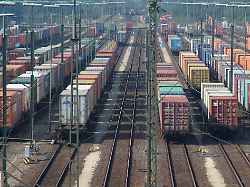“Will grow this year”
Head of the Chancellery: Germany is not in recession
February 13, 2024, 11:18 a.m
Listen to article
This audio version was artificially generated. More info | Send feedback
Many economic indicators are currently gloomy and the German economy is languishing. However, Chancellor Schmidt doesn’t want to know anything about a recession this year. He promises growth. Investments, the stable labor market and increased real wages give him hope.
Head of the Chancellery Wolfgang Schmidt does not see Germany in a recession. “We don’t have a recession,” said the SPD politician in Berlin at the Association of Berlin Merchants and Industrialists (VBKI). “We will see growth this year,” he added, pointing to very high investments by the federal government.
In addition to the 58 billion euros in the budget, 49 billion euros would come from the so-called Climate and Transformation Fund (KTF). There are currently no signs of a recession. “The labor market is very stable.” Real wages have also risen again, which will lead to increased purchasing power.
Schmidt referred to further necessary reforms, especially in reducing bureaucracy. The government has also passed the Skilled Immigration Act as a measure to combat the shortage of skilled workers. However, because of the debt brake in the Basic Law, Germany cannot take the path like the USA of financing investments through massive debt. The Ukraine war alone means a burden on the 2024 federal budget of around 17 billion euros.
Weak start to the year
The IFO Institute recently lowered its economic forecast due to the federal government’s austerity measures. It only sees 0.7 percent growth for 2024 instead of the 0.9 percent it had predicted in mid-December.
The Houthis’ attacks on merchant ships in the Red Sea remain a cause for concern, disrupting supply chains and driving up freight prices. Private households also continue to be burdened by high food and energy costs. This year, many people are once again threatened with hefty additional operating costs.
The purchasing managers’ index for the entire private sector – industry and service providers in Germany together – fell by 0.3 points to 47.1 points in January. The financial service provider S&P Global announced this in its monthly company survey. The barometer thus moved away from the growth threshold of 50 points.
There was a surprising increase in orders in German industry in December – but only due to a number of large orders. Many companies, however, had surprisingly reduced their production significantly. Industry, construction and energy suppliers together produced 1.6 percent less than in the previous month, as the Federal Statistical Office announced. It was the fourth consecutive decline.
